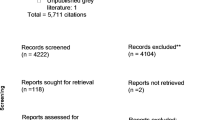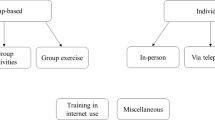Abstract
Purpose
Physical activity minimizes the side effects of cancer; yet, participation rates among cancer survivors are low. Technological innovations are promoted as efficient means for communication and remote monitoring, but little is known about acceptability among female cancer survivors. The purpose of this study was to examine female cancer survivor perspectives on remote monitoring and communication to support independent, physical activity maintenance after completing a structured, facility-based program.
Methods
Participants were 19 female cancer survivors (mean age 56.3) recruited after completing a 12-week exercise-based oncology rehabilitation program. Semi-structured interviews were conducted with participants following a 4-week pilot trial of a tailored text message, FitBit®, and health coach intervention to support independent physical activity maintenance. All interviews were audio-recorded and transcribed. Transcripts from the interviews were iteratively coded by two team members using a thematic analysis.
Results
Participants reported acceptance and satisfaction with remote monitoring and communication. Emergent themes related to technology-based support for physical activity maintenance included the following: (1) accountability to a remote partner; (2) plan Bs, planning for barriers; (3) the habit cycle; (4) convenience through technology; and (5) reclaiming health ownership following a cancer diagnosis.
Conclusions
Participants attributed physical activity maintenance to accountability enabled by technology. Communication based on remote monitoring was perceived as encouraging and not intrusive, during the transition to a home program.
Implications for cancer survivors
This study highlights the importance of accountability and support for physical activity adherence and the positive role that technology can provide for female cancer survivors to regain control of health management.
Similar content being viewed by others
References
Miller KD, Siegel RL, Lin CC, Mariotto AB, Kramer JL, Rowland JH, Stein KD, Alteri R, Jemal A (2016) Cancer treatment and survivorship statistics, 2016. CA Cancer J Clin 66:271–289. https://doi.org/10.3322/caac.21349
Rowland JH, Bellizzi KM (2014) Cancer survivorship issues: life after treatment and implications for an aging population. J Clin Oncol 32:2662–2668. https://doi.org/10.1200/JCO.2014.55.8361
Bluethmann SM, Mariotto AB, Rowland JH (2016) Anticipating the “silver tsunami”: prevalence trajectories and comorbidity burden among older cancer survivors in the United States. Cancer Epidemiol Biomark Prev 25:1029–1036. https://doi.org/10.1158/1055-9965.EPI-16-0133
Reiner M, Niermann C, Jekauc D, Woll A (2013) Long-term health benefits of physical activity – a systematic review of longitudinal studies. BMC Public Health 13:813. https://doi.org/10.1186/1471-2458-13-813
Ballard-Barbash R, Friedenreich CM, Courneya KS, Siddiqi SM, McTiernan A, Alfano CM (2012) Physical activity, biomarkers, and disease outcomes in cancer survivors: a systematic review. J Natl Cancer Inst 104:815–840. https://doi.org/10.1093/jnci/djs207
Blanchard CM, Courneya KS, Stein K, American Cancer Society’s SCS-II (2008) Cancer survivors’ adherence to lifestyle behavior recommendations and associations with health-related quality of life: results from the American Cancer Society’s SCS-II. J Clin Oncol 26:2198–2204. https://doi.org/10.1200/JCO.2007.14.6217
Smith WA, Nolan VG, Robison LL, Hudson MM, Ness KK (2011) Physical activity among cancer survivors and those with no history of cancer— a report from the National Health and Nutrition Examination Survey 2003–2006. Am J Transl Res 3:342–350
Littman AJ, Tang M-T, Rossing MA (2010) Longitudinal study of recreational physical activity in breast cancer survivors. J Cancer Surviv 4:119–127
Devoogdt N, Kampen MV, Geraerts I, Coremans T, Fieuws S, Lefevre J, Philippaerts R, Truijen S, Neven P, Christiaens M-R (2010) Physical activity levels after treatment for breast cancer: one-year follow-up. Breast Cancer Res Treat 123:417–425. https://doi.org/10.1007/s10549-010-0997-6
Cheifetz O, Dorsay JP, MacDermid JC (2015) Exercise facilitators and barriers following participation in a community-based exercise and education program for cancer survivors. J Exerc Rehabil 11:20–29. https://doi.org/10.12965/jer.150183
Haas BK, Kimmel G, Hermanns M, Deal B (2012) Community-based fitsteps for life exercise program for persons with cancer: 5-year evaluation. J Oncol Pract 8:320–324. https://doi.org/10.1200/JOP.2012.000555
Ottenbacher AJ, Day RS, Taylor WC, Sharma SV, Sloane R, Snyder DC, Kraus WE, Demark-Wahnefried W (2011) Exercise among breast and prostate cancer survivors—what are their barriers? J Cancer Surviv 5:413–419. https://doi.org/10.1007/s11764-011-0184-8
Blaney JM, Lowe-Strong A, Rankin-Watt J, Campbell A, Gracey JH (2013) Cancer survivors’ exercise barriers, facilitators and preferences in the context of fatigue, quality of life and physical activity participation: a questionnaire–survey. Psychooncology 22:186–194. https://doi.org/10.1002/pon.2072
Hefferon K, Murphy H, McLeod J, Mutrie N, Campbell A (2013) Understanding barriers to exercise implementation 5-year post-breast cancer diagnosis: a large-scale qualitative study. Health Educ Res 28:843–856. https://doi.org/10.1093/her/cyt083
Turner RR, Steed L, Quirk H, Greasley RU, Saxton JM, Taylor SJ, Rosario DJ, Thaha MA, Bourke L (2018) Interventions for promoting habitual exercise in people living with and beyond cancer. Cochrane Database Syst Rev. https://doi.org/10.1002/14651858.CD010192.pub3
Fazzino TL, Sporn NJ, Befort CA (2016) A qualitative evaluation of a group phone-based weight loss intervention for rural breast cancer survivors: themes and mechanisms of success. Support Care Cancer 24:3165–3173. https://doi.org/10.1007/s00520-016-3149-7
Olson EA, Mullen SP, Rogers LQ, Courneya KS, Verhulst S, McAuley E (2014) Meeting physical activity guidelines in rural breast cancer survivors. Am J Health Behav 38:890–899. https://doi.org/10.5993/AJHB.38.6.11
Roberts AL, Fisher A, Smith L, Heinrich M, Potts HWW (2017) Digital health behaviour change interventions targeting physical activity and diet in cancer survivors: a systematic review and meta-analysis. J Cancer Surviv 11:704–719. https://doi.org/10.1007/s11764-017-0632-1
Cadmus-Bertram LA, Marcus BH, Patterson RE, Parker BA, Morey BL (2015) Randomized trial of a fitbit-based physical activity intervention for women. Am J Prev Med 49:414–418. https://doi.org/10.1016/j.amepre.2015.01.020
Bock B, Heron K, Jennings E, Morrow K, Cobb V, Magee J, Fava J, Deutsch C, Foster R (2013) A text message delivered smoking cessation intervention: the initial trial of TXT-2-quit: randomized controlled trial. JMIR Mhealth Uhealth 1:e17. https://doi.org/10.2196/mhealth.2522
Burke LE, Styn MA, Sereika SM, Conroy MB, Ye L, Glanz K, Sevick MA, Ewing LJ (2012) Using mHealth technology to enhance self-monitoring for weight loss: a randomized trial. Am J Prev Med 43:20–26. https://doi.org/10.1016/j.amepre.2012.03.016
Robertson MC, Tsai E, Lyons EJ, Srinivasan S, Swartz MC, Baum ML, Basen-Engquist KM (2017) Mobile health physical activity intervention preferences in cancer survivors: a qualitative study. JMIR MHealth UHealth 5. https://doi.org/10.2196/mhealth.6970
Odeh B, Kayyali R, Nabhani-Gebara S, Philip N (2015) Optimizing cancer care through mobile health. Support Care Cancer 23:2183–2188. https://doi.org/10.1007/s00520-015-2627-7
Nguyen NH, Hadgraft NT, Moore MM, Rosenberg DE, Lynch C, Reeves MM, Lynch BM (2017) A qualitative evaluation of breast cancer survivors’ acceptance of and preferences for consumer wearable technology activity trackers. Support Care Cancer 25:3375–3384. https://doi.org/10.1007/s00520-017-3756-y
Rosenberg D, Kadokura EA, Bouldin ED, Miyawaki CE, Higano CS, Hartzler AL (2016) Acceptability of Fitbit for physical activity tracking within clinical care among men with prostate cancer. AMIA Annu Symp Proc 2016:1050–1059
Gell NM, Grover KW, Humble M, Sexton M, Dittus K (2016) Efficacy, feasibility, and acceptability of a novel technology-based intervention to support physical activity in cancer survivors. Support Care Cancer 25:1291–1300. https://doi.org/10.1007/s00520-016-3523-5
Schmitz KH, Courneya KS, Matthews C, Demark-Wahnefried W, Galvão DA, Pinto BM, Irwin ML, Wolin KY, Segal RJ, Lucia A, Schneider CM, von Gruenigen VE, Schwartz AL, American College of Sports Medicine (2010) American College of Sports Medicine roundtable on exercise guidelines for cancer survivors. Med Sci Sports Exerc 42:1409–1426. https://doi.org/10.1249/MSS.0b013e3181e0c112
Dittus KL, Lakoski SG, Savage PD, Kokinda N, Toth M, Stevens D, Woods K, O’Brien P, Ades PA (2015) Exercise-based oncology rehabilitation: leveraging the cardiac rehabilitation model. J Cardiopulm Rehabil Prev 35:130–139. https://doi.org/10.1097/HCR.0000000000000091
Braun V, Clarke V (2006) Using thematic analysis in psychology. Qual Res Psychol 3:77–101
Morton K, Sutton S, Hardeman W, Troughton J, Yates T, Griffin S, Davies M, Khunti K, Eborall H (2015) A text-messaging and pedometer program to promote physical activity in people at high risk of type 2 diabetes: the development of the propels follow-on support program. JMIR MHealth UHealth 3. https://doi.org/10.2196/mhealth.5026
Arigo D (2015) Promoting physical activity among women using wearable technology and online social connectivity: a feasibility study. Health Psychol Behav Med 3:391–409. https://doi.org/10.1080/21642850.2015.1118350
Maglalang DD, Yoo GJ, Ursua RA, Villanueva C, Chesla CA, Bender MS (2017) “I don’t have to explain, people understand”: acceptability and cultural relevance of a mobile health lifestyle intervention for Filipinos with type 2 diabetes. Ethn Dis 27:143–154
Lee E, Han S (2015) Determinants of adoption of mobile health services. Online Inf Rev 39:556–573. https://doi.org/10.1108/OIR-01-2015-0007
Maher C, Ryan J, Ambrosi C, Edney S (2017) Users’ experiences of wearable activity trackers: a cross-sectional study. BMC Public Health 17:880. https://doi.org/10.1186/s12889-017-4888-1
Buller DB, Borland R, Bettinghaus EP, Shane JH, Zimmerman DE (2013) Randomized trial of a smartphone mobile application compared to text messaging to support smoking cessation. Telemed E-Health 20:206–214. https://doi.org/10.1089/tmj.2013.0169
Gucciardi E, Cameron JI, Liao CD, Palmer A, Stewart DE (2007) Program design features that can improve participation in health education interventions. BMC Med Res Methodol 7:47. https://doi.org/10.1186/1471-2288-7-47
Doyle N (2008) Cancer survivorship: evolutionary concept analysis. J Adv Nurs 62:499–509. https://doi.org/10.1111/j.1365-2648.2008.04617.x
Pelusi J (1997) The lived experience of surviving breast cancer. Oncol Nurs Forum 24:1343–1353
Mellon S, Northouse LL, Weiss LK (2006) A population-based study of the quality of life of cancer survivors and their family caregivers. Cancer Nurs 29:120–131
Auchincloss SS (1995) After treatment. Psychosocial issues in gynecologic cancer survivorship. Cancer 76:2117–2124
Wurz A, St-Aubin A, Brunet J (2015) Breast cancer survivors’ barriers and motives for participating in a group-based physical activity program offered in the community. Support Care Cancer 23:2407–2416. https://doi.org/10.1007/s00520-014-2596-2
Loprinzi PD, Cardinal BJ, Si Q, Bennett JA, Winters-Stone KM (2012) Theory-based predictors of follow-up exercise behavior after a supervised exercise intervention in older breast cancer survivors. Support Care Cancer 20:2511–2521. https://doi.org/10.1007/s00520-011-1360-0
Schmidt ME, Wiskemann J, Ulrich CM, Schneeweiss A, Steindorf K (2017) Self-reported physical activity behavior of breast cancer survivors during and after adjuvant therapy: 12 months follow-up of two randomized exercise intervention trials. Acta Oncol 56:618–627. https://doi.org/10.1080/0284186X.2016.1275776
Spence RR, Heesch KC, Brown WJ (2011) Colorectal cancer survivors’ exercise experiences and preferences: qualitative findings from an exercise rehabilitation programme immediately after chemotherapy. Eur J Cancer Care (Engl) 20:257–266
Atienza AA, Zarcadoolas C, Vaughon W, Hughes P, Patel V, Chou W-YS, Pritts J (2015) Consumer attitudes and perceptions on mHealth privacy and security: findings from a mixed-methods study. J Health Commun 20:673–679
Acknowledgments
We would like to thank Dr. Jeanine Carr, Dr. Michelle Sexton, and Dr. Emily Day for their assistance with this research.
Funding
This work was supported by a REACH grant award from the University of Vermont.
Author information
Authors and Affiliations
Contributions
All authors contributed to the study conception and design. Alexandra Tursi and Nancy Gell performed material preparation, data collection, and analysis. The first draft of the manuscript was written by Alexandra Tursi and Nancy Gell with additional contributions and review by Kristen Grover and Kim Dittus. All authors read and approved the final manuscript.
Corresponding author
Ethics declarations
Conflict of interest
The authors declare that they have no conflict of interest.
Ethical approval
All procedures performed involving human participants were in accordance with the ethical standards of the institutional research committee (University of Vermont Research Protections Office Institutional Review Board, CHRMS 15-405, and the University of Vermont Cancer Center, VCC 1505-1) and with the 1964 Helsinki declaration and its later amendments or comparable ethical standards.
Informed consent
Informed consent was obtained from all individual participants included in the study.
Additional information
Publisher’s note
Springer Nature remains neutral with regard to jurisdictional claims in published maps and institutional affiliations.
Rights and permissions
About this article
Cite this article
Gell, N.M., Tursi, A., Grover, K.W. et al. Female cancer survivor perspectives on remote intervention components to support physical activity maintenance. Support Care Cancer 28, 2185–2194 (2020). https://doi.org/10.1007/s00520-019-05038-y
Received:
Accepted:
Published:
Issue Date:
DOI: https://doi.org/10.1007/s00520-019-05038-y




